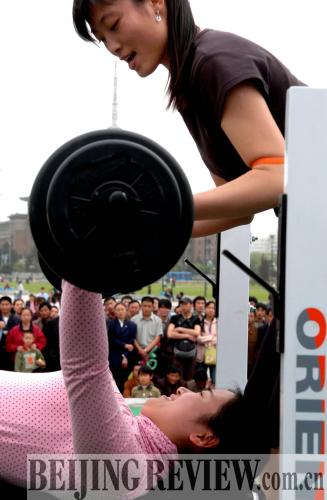|
"Without scientific guidance, there is no real exercise and fitness," said Tian Ye, Director of the Institute of Sport Science at China's General Administration of Sport. He said randomness exists in the public's exercise routine whose effects are not always obvious and can lead to injury.
 |
|
GETTING A SPOT: A fitness coach guides a citizen in Changchun, Jilin Province, through a chest press exercise on May 7, 2004 (XU JIAJUN) |
"We should introduce more innovations and offer more reliable guidance in physical tests, exercise routine development, and exercise techniques," he said. "China has been doing well using advanced science and technology in athletics, but it needs to further combine scientific achievements with public sports and exercise programs."
Tian and his team have set up a training guidance system targeting children, the middle-aged, the elderly and patients of four chronic diseases, respectively.
In July, China's General Administration of Sport and the National Physical Fitness Monitoring Center began a nationwide movement that looks to offer fitness lessons and advice to educate citizens on better ways to exercise.
The Chinese Government chose August 8 to be the country's National Fitness Day. A fitness technology services center was opened in Jinan, Shandong Province on that day this year.
Li Weiping, Secretary of the Shandong Research Center of Sports Science, said the center's goal is to make science and technology serve fitness. In 2010, Shandong will see its physical fitness monitoring network fully cover all its residents, he said.
Muscle health
"A healthy body needs the support of healthy muscles," said state-level sports instructor Zhao Zhixin. "Exercising the muscles is an effective way of easing health problems after middle age."
Although more and more people are taking part in different kinds of exercises, few of them really know the importance of muscular health to their bodies.
"Muscle health is important to the overall health of the whole body," said Chang Cuiqing, a researcher with the Institute of Sports Medicine under the Third Hospital of Peking University.
She said muscles are closely related to the health of the skeleton and cardiovascular system and that healthy muscles can greatly reduce the risk of getting metabolic diseases, such as hypertension, hyperlipidemia and diabetes.
She believes that reasonable nutrition is the key to unlocking the effectiveness of exercise. After high-intensity exercises, people should let their muscles rest and quickly give them sufficient nutrition.
"Effective fitness is from reasonable nutrition and scientific exercises," she said.
The growth and restoration of muscles cannot be achieved without protein. "Besides proper exercise, getting enough protein is another effective way to achieve healthy muscles. Milk can provide that rich protein," Chang said.
She said there is a kind of soluble protein called whey from milk that contains amino acids and a series of biologically active ingredients that are necessary for the human body. The composition of the amino acids is the same as that found in skeletal muscles.
Whey, called a fast protein, is more digestible than either egg or meat protein, she said.
"Although there are only 0.6 grams of whey protein in 100 grams of milk, it is enough for ordinary people to get 300 grams of milk or milk products a day," she said.
Research has shown that getting 20 grams of whey protein after weight-bearing exercises can promote the restoration of muscles and help them stay healthy.
"It can also promote the consumption of fat. For that reason, athletes always select whey protein as their first choice to help restore and strengthen muscles," Chang said. | 